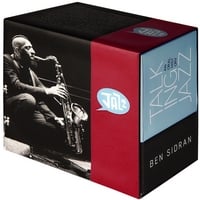Poemomatopoeia
Collaboration with musicians is only natural: Pound’s notion that poetry never strays far from music and Allen Ginsberg’s romantic notion of poetry’s return to its origins in chanted dramatic/choral performance; Olson’s heart-ear-breath. I always edit for reading aloud, & somebody said you shouldn’t put too much emphasis on live reading, on “performance,” because it cheapens poetry, orienting it toward show business instead of writing. But I don’t edit for show business & I’m still pretty uncomfortable with the word “performance.”
But a poem has to read well on the page as well as on stage… it has to hold up over hundreds of silent readings and over hundreds of live ones. I always edit for the voice.
Go beyond preconception—Nathaniel Mackey: “When I first started listening to improvised music in my early teens — up to that point I had mainly been listening to R&B and Rock ‘n’ Roll, popular music you hear on the radio — it didn’t make a whole lot of sense to me. I don’t know what it was about it that made me go back and give it a chance, but it was something I had to learn how to listen to. And I did learn how to listen to it, by going back and listening on repeated occasions. That was how I got into the music of Miles Davis, John Coltrane, and others in the early sixties. I came to the outside players later and had a similar experience with them. In high school I kept reading and hearing about Ornette Coleman in places like Down Beat. There was a lot of fuss being made about what he was up to, so I wanted to check it out. I remember buying an Ornette Coleman album and it just sounded very strange and weird. I couldn’t figure it out but I kept listening to it and after a while it not only made sense to me, there was a beauty to it. It was unlike the beauty that I heard in Miles Davis or John Coltrane, but it was beauty. The ability to get into something that initially is forbidding or intimidating or just doesn’t speak to you at all is one that is tested and proven. I tend to stay with things which may, on first or second or third hearing or reading, present me with difficulties that make it seem like it isn’t going to go anywhere. (…) What any experimental art is trying to get you to do is move beyond your preconceptions and your expectations regarding what should be happening, what’s going to happen, what kinds of effects it should have, and enter a liminal state in which those things can be redefined in the way that the particular artist or piece of art is proposing.”—from an interview with Chris Funkhouser.
“the HEAD, by way of the EAR, to the SYLLABLE
the HEART, by way of the BREATH, to the LINE”
— Charles Olson.
In other words, what you hear you translate into the right syllable to record the sound; the heart provides the beat, pushed by the breath, creating the line. It isn’t a matter of formulated verse patterns but of a freely improvising dynamic pulse, with a regular feel that varies enough to keep it interesting. The difference between formal verse and free verse is like the difference between a drum machine and a live drummer.
Cecil Taylor: “A man like Monk… is concerned with growing and enriching his musical conception, and what he does comes as a living idea out of his life’s experience, not from a theory. It may or may not turn out to be atonal. Similarly, as Miles Davis’ European technical facility becomes sparser, his comment from the Negro folk tradition becomes more incisive. He’s been an important innovator in jazz, but again, not out of theory, but out of what he hears and lives.” –liner notes, The Cecil Taylor Quartet: Looking Ahead!
Language is not a virus, contrary to William Burroughs, repeated by Laurie Anderson and others. It’s a beautiful gift without which we would be immensely lonely. Poetry is a way of life, not a contest. I am not here to get ahead of anybody, but to share what I’ve got.
There has to be a little mystery built in,
or no one will read to the end
& that’s why people hate poetry,
they say it’s purposely obscure & speaks in a some fancy, foreign tongue….
just like life it defies easy explanation
just like life speaks in a language you don’t understand



